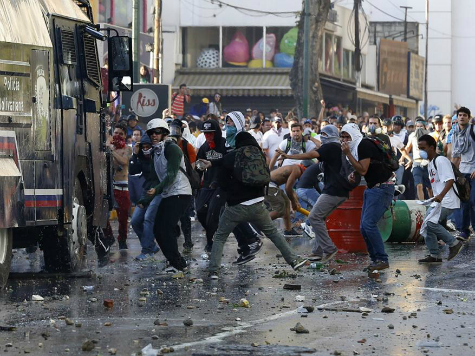Venezuelan President Nicolás Maduro is desperate for a platform that will legitimize the rampant violence his police force perpetrates on unarmed civilians. He writes in The New York Times Wednesday that after 1,900 arrests and 38 deaths, “now is a time for dialogue and diplomacy.”
Maduro appears as a guest columnist in the A section of the newspaper, making the case against a government almost universally reviled by those who believe in Western notions of individual human rights. The newspaper that brought the “radical, democratic and therefore anti-Communist” Fidel Castro to the American public’s consciousness has lent its pages to a more palatable, less off-the-rails conspiratorial version of the Venezuelan government’s narrative against the protests. People are to believe that those on the streets are all members of the country’s elite, the “1%,” and that Maduro has improved the country’s economic situation by slowly impoverishing those elites–or, as Maduro puts it, “reducing income inequality.”
“According to the United Nations, Venezuela has consistently reduced inequality: It now has the lowest income inequality in the region,” Maduro writes, not mentioning that the oil-rich nation has a toilet paper shortage. He also does not mention that its resources have been plundered so thoroughly that the government recently imposed food rations to attempt to prevent famine. Those who oppose such a state of affairs, Maduro writes, are “people in the wealthier segments of society who seek to reverse the gains of the democratic process that have benefited the vast majority of the people.”
Maduro lingers on this concept of the “democratic process,” claiming that such a thing exists in Venezuela. “Since 1998,” Maduro asserts, “the movement founded by Hugo Chávez has won more than a dozen presidential, parliamentary and local elections through an electoral process that former American President Jimmy Carter has called ‘the best in the world.'” Maduro deigns to share that his own election was plagued with fraud, and that international observers called for the invalidation of his “victory” against opponent Henrique Capriles Radonski. Maduro also fails to note that he has been governing by decree since November, effectively violating separation of powers in his country.
Maduro then disparages protesters as violent. “Antigovernment protesters have physically attacked and damaged health care clinics, burned down a university in Táchira State and thrown Molotov cocktails and rocks at buses,” Maduro writes, daring to mention Táchira state, whose biggest city, San Cristóbal, has been under martial law for months and whose mayor Maduro recently used secret police to arrest.
Maduro may be forgiven for not writing about the illegal detentions of mayors like Daniel Ceballos or fellow recent New York Times guest columnist Leopoldo López; after all, addressing the rapid rise in the number of political prisoners in an allegedly democratic country belies his greater point. However, his shrewd appeal to the American people by labeling the opposition as enemies of the Venezuelan constitution is perhaps his most disingenuous point in a column fraught with falsehoods.
“The protesters have a single goal: the unconstitutional ouster of the democratically elected government,” Maduro writes, noting that many who supported a 2002 coup attempt against Hugo Chávez are also supporting the current protests. “Those involved in the 2002 coup immediately disbanded the Supreme Court and the legislature, and scrapped the Constitution.”
To the American reader, a state constitution is the core of its political values and the cornerstone of state infrastructure. It is a document that defines what the country stands for and is the only safeguard between that country and tyranny. This exists in United States because the Constitution’s core does not change over time. Amendments aside, the Constitution is the Constitution and has been the Constitution since 1789.
The Venezuelan constitution was implemented by Hugo Chávez in 1999. The version he replaced had been in force since 1961.
“Constitutional” in Venezuela does not mean what it means in the United States, though Maduro is obviously hoping that readers will not bother to note that detail. To defy Venezuela’s constitution is to defy the structure of a state designed for the benefit of Hugo Chávez, to the detriment of any opposition party.
Be that as it may, Maduro has managed to run entirely afoul of the 1999 constitution, with his lackey Diosdado Cabello having ousted Congresswoman María Corina Machado from the National Assembly for calling for international intervention in the current Venezuelan crisis. Maduro’s police also attacked Machado with tear gas Tuesday for claiming her ouster was illegitimate, a violation of Chapter III, Article 57 of the country’s constitution: “All people have the right to freely express their thoughts, their ideas or opinions aloud, in writing, or through any other medium of expression, and to make use of any communications and distributive medium, without censorship.”
Maduro’s attempt to defend himself to the American people is, like his own career, an embarrassing, malicious sham. The moderate tone he strikes distinguishes it, however, from his usual fare. While he may speak humbly in a message to the people of the United States when intending to dupe them into thinking a free Venezuela is the real enemy, when speaking to his own people, he has no such scruples.
Maduro may simply call the opposition “wealthy” in the pages of The New York Times, but in every other waking moment of his tenure, conservatives in his country are deemed “devils,” “monsters,” and “fascists” who must be crushed “with an iron fist.”

COMMENTS
Please let us know if you're having issues with commenting.